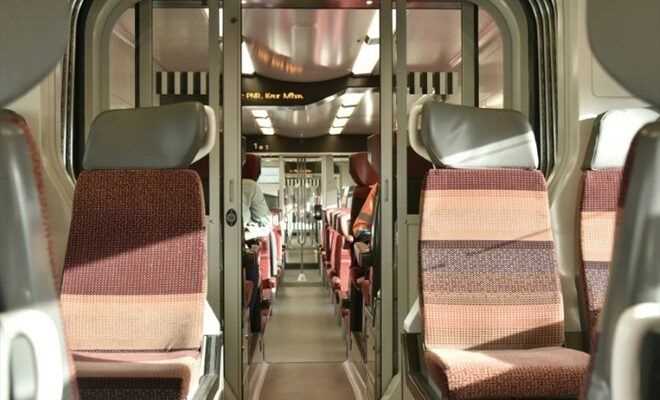The regional express train (TER) at the brand new station in Dakar on December 22, 2021 supposed to revolutionize public transport in the West African metropolis (AFP / SEYLLOU)
Senegal is inaugurating a regional express train (TER) in Dakar on Monday, launched by President Macky Sall to modernize transport, having cost more than a billion euros and supposed to put an end to monster traffic jams in the West African metropolis.
The Head of State will preside Monday in the new town of Diamniadio, near Dakar, the commissioning ceremony of the line, whose work began five years ago, we learned from his services.
Passenger traffic should take its cruising speed within ten days, after “a discovery program” offered initially to users so that they can “appropriate” this new means of transport, according to the same sources. .

The regional express train (TER), during tests on November 24, 2021, supposed to revolutionize public transport in the Senegalese metropolis of Dakar (AFP / SEYLLOU)
The TER must connect in about twenty minutes the 36 km separating Dakar from Diamniadio, a section on which users usually lose hours by car.
The trains will run at a top speed of 160 km / h and will be able to transport 115,000 people per day, from 5 a.m. to 10 p.m., according to the promoters. The rotations will be carried out by 15 trainsets of four cars each, built by the French group Alstom.
The construction of the TER and its new rails involved “about twenty French companies” including Eiffage, Engie, Thales, SNCF but also Turkish and Senegalese. Commissioning has been postponed several times since the start of work in early 2017.
– Millions lost –
They cost 780 billion FCFA (more than 1.1 billion euros) financed on own funds and thanks to loans – in particular French – by the State of Senegal, “owner of all the infrastructure”, affirmed to AFP Abdou Ndéné Sall, Managing Director of Senter, the TER heritage company wholly owned by the Senegalese State.

Agents of the regional express train (TER) supposed to revolutionize public transport in the Senegalese capital Dakar, at the control center of Colobane, Senegal, on December 22, 2021 (AFP / SEYLLOU)
The delay “may seem long but we have broken speed records in construction despite the Covid-19. The TER will be one of the most modern means of transport in the world,” Stéphane Volant, chairman of the board, told AFP. administration of Seter, the TER operating company and a subsidiary of the French public railway transport company (SNCF).
The TER is part of the Emerging Senegal Plan (PSE), a development program supposed to end by 2035 and initiated by President Sall, in power since 2012.
It aims to relieve congestion in Dakar, which concentrates on 0.3% of the territory the fifth of the 17 million Senegalese and almost all of the country’s economic activities. Traffic jams officially cost the city 152 million euros per year.

The regional express train (TER) station in Dakar, Senegal on December 22, 2021 (AFP / SEYLLOU)
Alongside a toll motorway that has been operational for ten years, the TER will be combined with fast bus lines which will soon run on reserved lanes. In a second phase, it should make it possible to reach Diass airport in 45 minutes, over 57 km.
Transport in Dakar is currently provided by buses, “fast coaches”, used vehicles and taxis. It does not “meet satisfactorily the travel needs estimated at 124,000 passengers in the morning rush hour”, according to a document from the African Development Bank, partner of the TER project.
– “Not a priority” –
Senegal has signed a five-year renewable “management, operation and maintenance contract” with the SNCF Seter subsidiary, “time to transfer certain skills to Senegalese staff,” said Abdou Ndéné Sall.
Senegal is expected to take 34% of Seter’s capital within six months, according to Mr. Volant. The project will employ 1,000 people including 984 Senegalese and 16 expatriates.

Interior view of the regional express train (TER) in Dakar, Senegal on December 22, 2021 (AFP / SEYLLOU)
Prices range from 500 FCFA (less than one euro) to 1,500 FCFA (2.29 euros) up to Diamniadio in second class against a single rate of 2,500 FCFA (around 4 euros) in first class.
The partisans of power present the TER as a success of President Sall but thousands of expropriated people cry out their anger.
“The TER has impoverished us”, told AFP Amina Bayo, head of a collective of expropriated people denouncing a “costly project” and demanding 76 million euros in compensation from the State, which said she had satisfied its obligations without specifying the amount of the sums granted.
“The money invested in the TER could have been used to rehabilitate the Senegalese rail network. The TER was not a priority,” Senegalese economist Demba Moussa Dembélé told AFP.
© 2021 AFP
Did you like this article ? Share it with your friends with the buttons below.




